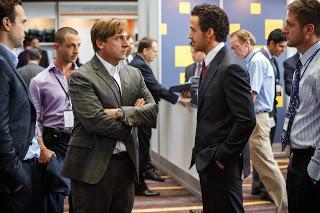 In adapting Michael Lewis's The Big Short into a movie, Adam McKay faced an insurmountable obstacle: relating financial misdeeds and investment schemes to mainstream viewers. McKay casts his story as a black comedy, mixing ridicule and outrage while assaulting viewers with outré imagery.
In adapting Michael Lewis's The Big Short into a movie, Adam McKay faced an insurmountable obstacle: relating financial misdeeds and investment schemes to mainstream viewers. McKay casts his story as a black comedy, mixing ridicule and outrage while assaulting viewers with outré imagery. In 2005, hedge fund manager Michael Burry (Christian Bale) tracks subprime loans indicating weakness in the American housing market. He creates a market based on credit swaps, positioning himself to make a fortune. Jared Vennett (Ryan Gosling), a cutthroat investor, and trader Mark Baum (Steve Carell) find the banks subsidized by fraudulent AAA ratings and synthetic loans; neophyte investors Charlie Geller (John Magaro) and Jamie Shipley (Finn Witrock) make a killing selling fortunes. These protagonists find themselves betting against the American economy, heading towards a precipitous collapse.
Surprisingly, The Big Short's main flaw isn't confusing viewers. It's an off-the-wall style that's more alienating than engaging. Demanding we don't doze off during discussions of short selling, McKay inundates us with Godardian segues to absurdity. Here's an animation of someone's distended testicle! Or a quote sourced to some guy in a bar! How about cutaways to Anthony Bourdain or Selena Gomez explaining CDOs? It's one way to grab attention, but it wears extremely thin at 130 minutes.
If the above doesn't scare you, The Big Short does an excellent job elucidating its concepts. McKay paints a commendably detailed, yet understandable for lay viewers. Investigators interview frat boy realtors who gloat over screwing their customers; abandoned houses host alligators in swimming pools. Investors, whether strippers buying worthless properties or bankers with too much confidence, keep feeding money into the system. Nothing keeps the economy afloat except inertia and collusion.
Our protagonists are ignored, rebuffed by bankers, journalists and federal investigators; everyone's too complacent to see the increasingly obvious. What's conventional wisdom against the word of loud-mouthed miscreants? Not that our heroes are any better: Michael recalls his investments at the optimal moment, while Charlie and Jamie cheer their windfall as it destroys the economy. Everyone's guilty, but few are punished when the banks become "too big to fail."
Ryan Gosling helps us along with smooth amorality and cutting commentary. Christian Bale's one-note misanthropy seems a pale echo of American Psycho and Brad Pitt's role amounts to a cameo. Steve Carrell plays the only character with a moral compass, who twists his investment into an act of vengeance. John Magaro and Finn Witrock have a nice doubles-act as two investors equally baffled by their luck and the system's stupidity.
Whatever its stylistic failings, The Big Short does a commendable job tackling an impossible subject. Unwittingly or not, corporate dramas like The Wolf of Wall Street typically reduce white collar crime to a rotten apple. The Big Short's big picture approach shows everyone complicit in a rotten system.

